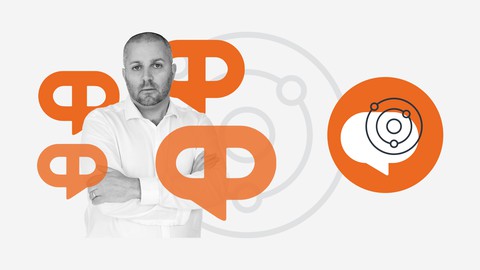
Diploma Course in Modern Applied Psychology (DiMAP.)
Diploma Course in Modern Applied Psychology (DiMAP.), available at $129.99, has an average rating of 4.5, with 182 lectures, based on 9481 reviews, and has 50996 subscribers.
You will learn about Identify the motivating factors behind all patterns of human behavior. Make smarter, more calculated decisions by learning from your past. Use your knowledge to solve problems that directly affect people's lives. Improve your ability to reason and regulate your emotional responses. Make more well-informed judgments that are in line with your priorities. Separate behaviour and personality from the heart of human identity. Accurately predict how people will act, perceive, reason and behave. Build stronger connections and more genuine relationships with people. Raise your mind like a philosopher and interpret life's events accurately. And much, much more. This course is ideal for individuals who are This course is best suited to students who are interested in improving themselves. or Anyone interested in enhancing their personal or professional development. or This course is suitable for men and women, regardless of age or ethnic background. or Students with an interest in psychology will find this course particularly interesting. or This course is for students who are dedicated to self-discovery and improvement. or The course can be taken standalone or in conjunction with another Achology training. It is particularly useful for This course is best suited to students who are interested in improving themselves. or Anyone interested in enhancing their personal or professional development. or This course is suitable for men and women, regardless of age or ethnic background. or Students with an interest in psychology will find this course particularly interesting. or This course is for students who are dedicated to self-discovery and improvement. or The course can be taken standalone or in conjunction with another Achology training.
Enroll now: Diploma Course in Modern Applied Psychology (DiMAP.)
Summary
Title: Diploma Course in Modern Applied Psychology (DiMAP.)
Price: $129.99
Average Rating: 4.5
Number of Lectures: 182
Number of Published Lectures: 180
Number of Curriculum Items: 182
Number of Published Curriculum Objects: 180
Original Price: £199.99
Quality Status: approved
Status: Live
What You Will Learn
- Identify the motivating factors behind all patterns of human behavior.
- Make smarter, more calculated decisions by learning from your past.
- Use your knowledge to solve problems that directly affect people's lives.
- Improve your ability to reason and regulate your emotional responses.
- Make more well-informed judgments that are in line with your priorities.
- Separate behaviour and personality from the heart of human identity.
- Accurately predict how people will act, perceive, reason and behave.
- Build stronger connections and more genuine relationships with people.
- Raise your mind like a philosopher and interpret life's events accurately.
- And much, much more.
Who Should Attend
- This course is best suited to students who are interested in improving themselves.
- Anyone interested in enhancing their personal or professional development.
- This course is suitable for men and women, regardless of age or ethnic background.
- Students with an interest in psychology will find this course particularly interesting.
- This course is for students who are dedicated to self-discovery and improvement.
- The course can be taken standalone or in conjunction with another Achology training.
Target Audiences
- This course is best suited to students who are interested in improving themselves.
- Anyone interested in enhancing their personal or professional development.
- This course is suitable for men and women, regardless of age or ethnic background.
- Students with an interest in psychology will find this course particularly interesting.
- This course is for students who are dedicated to self-discovery and improvement.
- The course can be taken standalone or in conjunction with another Achology training.
In today’s complex world, understanding human behaviour is not just fascinating, but also essential. The Diploma Course in Modern Applied Psychology (DiMAP) is designed to equip you with a deep understanding of the human mind, offering you the tools to unlock your potential and drive your personal growth.
With this Diploma Course in Modern Applied Psychology (DiMAP.), you will delve into the intricacies of human thought, emotion, and behaviour. You will gain insights into why we think, feel, and act the way we do, and how these processes can be influenced for the better. But this course isn’t just about theory; it’s about application. We take the latest psychological research and show you how to apply it in everyday life, for your benefit and the benefit of those around you.
Education and Personal Growth Through Understanding
The first thing you’ll notice about our course is that it is centred around you, the learner. We believe that by understanding ourselves, we can better understand others. That’s why the first part of the course focuses on self-understanding. You’ll explore your own thoughts, emotions, and behaviours, gaining a deeper understanding of what makes you tick.
This self-awareness will empower you to take control of your own life, make positive changes and achieve your goals.
Influencing Behavior:But understanding is just the beginning. The next step is influence. You’ll learn how to apply psychological principles to influence behaviour – both your own and others. You’ll learn techniques for changing habits, improving motivation, and enhancing performance. Whether you want to quit smoking, start exercising, or improve your work performance, this course will give you the tools to make it happen.
Making a Difference:Finally, the course shows you how to use your newfound skills to make a difference in the world. You’ll learn how to apply your knowledge of psychology to help others, whether that’s through counselling, coaching, or simply being a more understanding friend or family member. The skills you learn in this course have the potential to transform not just your life, but the lives of those around you.
Accessible Learning:We believe that education should be accessible to everyone. That’s why our course is designed to be easy to understand, with clear language and practical examples. We use stories and repetition to make the material engaging and easy to remember. Plus, our online format means you can learn at your own pace, from the comfort of your own home.
Join Us Today:The Diploma Course in Modern Applied Psychology (DiMAP) isn’t just a course; it’s a journey towards personal growth and empowerment. It’s about understanding the human mind, influencing behaviour, and making a difference. But most of all, it’s about you – your growth, your development, and your potential.
This training is part of a larger curriculum of professional development training resources designed by Kain Ramsay Ltd, and hosted within the Achology community peer-learning environment. The training course is accompanied by a 30-day money back guarantee, so if you’re not happy with the format, you can get your money back – no questions asked.
Course Curriculum
Chapter 1: The Foundations of Modern Applied Psychology
Lecture 1: Introducing the Diploma in Modern Applied Psychology
Lecture 2: Course Structure & Overview
Lecture 3: Join the FREE Achology ‘Principles into Practice’ Discussion Group
Lecture 4: Course Support and Frequently Asked Questions (FAQs)
Lecture 5: Exploring the Greater Questions of Life
Lecture 6: Psychological Flexibility & Rigidity
Lecture 7: The Purpose of Modern Applied Psychology
Lecture 8: A Guide to Developing Critical Thinking
Lecture 9: Developing a Healthy Mindset for Reflective Study
Lecture 10: The Three Levels of Knowing
Lecture 11: Exploring Various Psychological Perspectives
Lecture 12: Early History of Psychological Thought
Lecture 13: The Basis of Aristotelian Ethics
Lecture 14: From Experience to Ideas
Lecture 15: The Roots of Enlightenment & Human Awareness
Lecture 16: A Reasoning Soul in the Machine
Lecture 17: The five Different Levels of Human Experience
Lecture 18: Become the Self Which One Truly Is
Lecture 19: An Exercise for Existential Thinking
Lecture 20: Contemplating the Meaning of Life Part 1
Lecture 21: Contemplating the Meaning of Life Part 2
Lecture 22: Structuralism: The Beginnings of Psychological Study
Lecture 23: Functionalism: The Evolutionary Process of Thought
Lecture 24: Psychological Thought: The Seven Primary Schools
Lecture 25: Can Psychology be Regarded as an Empirical Science?
Chapter 2: The Behavioural School of Psychological Thought
Lecture 1: Introducing the Behavioral Psychology Section
Lecture 2: The 'Monkey See-Monkey Do' Effect
Lecture 3: Questions for Self-Reflection
Lecture 4: The Behavioral Socialization Process
Lecture 5: The Three Main Types of Behavioral Conditioning
Lecture 6: Pavlovian Psychology & Classical Conditioning
Lecture 7: The Formation of Memories & Behavioral Responses
Lecture 8: Associated Learning & Behavioral Responses
Lecture 9: Symbolic Representations (The Structure of…)
Lecture 10: Operant Conditioning and the Behavior of Organisms
Lecture 11: Operant Conditioning: Further Distinctions
Lecture 12: Questions for Self-Reflection
Lecture 13: Behaviorism: The Three Forms of Social Learning
Lecture 14: The Pygmalion Effect (Self Fulfilling Prophecy)
Lecture 15: Frankl, Logotherapy and Man's Search for Meaning
Lecture 16: The Stimulus-Response Quadrant
Lecture 17: IKIGAI: Your Reason For Being
Lecture 18: Albert Ellis' Fourteen IRRATIONAL Beliefs (Part 1)
Lecture 19: Albert Ellis' Fourteen IRRATIONAL Beliefs (Part 2)
Lecture 20: What Restrictions are there on the Mind’s Capacity to Learn?
Lecture 21: What is the Relationship Between Perception and Behavior?
Chapter 3: The Psychoanalytical School of Psychological Thought
Lecture 1: Psychoanalysis as a Conceptual Model of the World
Lecture 2: The Iceberg Model of Sigmund Freud
Lecture 3: How Limiting Beliefs Are Constructed
Lecture 4: Looking Inside: A Stimulus for Introspection
Lecture 5: Freud's ID, Ego & Superego
Lecture 6: Freud's ID, Ego & Superego: Further Distinctions
Lecture 7: A Psychoanalytically Focused Discussion
Lecture 8: Deconstructing The Psychoanalytically Focused Discussion
Lecture 9: Learning to Eliminate the Unconscious Facade
Lecture 10: The Johari Window: Model of Personal Insight
Lecture 11: Tying Everything Together So Far
Lecture 12: Making Wise Choices of Maturity and Character
Lecture 13: Self-Esteem – Versus – Self-Concept
Lecture 14: The Timeline of Belief Development
Lecture 15: The Defence Mechanisms of Anna Freud
Lecture 16: An Analysis of Irresponsibility Strategies (Defence Mechanisms)
Lecture 17: Relationship Habits: Transference and Counter-Transference
Lecture 18: Demonstrating Transference and Countertransference
Lecture 19: Neisser's Five Levels of Self-Awareness
Lecture 20: The Evaluative Process of Psychoanalysis
Chapter 4: The Developmental School of Psychological Thought
Lecture 1: Introducing the Developmental Psychology Section
Lecture 2: Piaget's Stages of Cognitive Development
Lecture 3: Kohlberg's Five Stages of Moral Development
Lecture 4: Erikson's Eight Stages of Human Development (Part 1)
Lecture 5: Erikson's Eight Stages of Human Development (Part 2)
Lecture 6: Questions to Evaluate our Ongoing Development
Lecture 7: The H. Eysenck Model of Personality & Development (Part 1)
Lecture 8: The H. Eysenck Model of Personality & Development (Part 2)
Lecture 9: Questions To Reflect Upon Your Own Personality
Lecture 10: Further Distinctions: Transference & Counter-Transference
Lecture 11: The 12 Jungian Archetypes/ Ego Types (Part 1)
Lecture 12: The 12 Jungian Archetypes/ Ego Types (Part 2)
Lecture 13: Visiting Transference & Counter-Transference Once Again
Lecture 14: The 12 Jungian Archetypes Workbook
Lecture 15: Presuppositions of Developmental Thinkers (Part 1)
Lecture 16: Presuppositions of Developmental Thinkers (Part 2)
Lecture 17: The Four Domains of Developmental Intelligence
Lecture 18: The Kain Ramsay ‘Core Identity’ Model
Lecture 19: Core Identity…Then What?
Lecture 20: The Collective Unconscious: by Carl Jung
Lecture 21: The Six Levels of Conscious Awareness
Lecture 22: The Eight Stages of Human Connection
Lecture 23: Kubler Ross Change Curve for Growth and Development
Lecture 24: The Kubler Ross Change Curve: Further Distinctions
Lecture 25: The Multiple Expressions of Intelligence
Lecture 26: Fixed – Vs – Growth Mindset
Lecture 27: End of Section Four Summary & Wrap-Up
Chapter 5: The Cognitive School of Psychological Thought
Lecture 1: Introduction to the Cognitive School of Thought
Lecture 2: Understanding the Human Cognitive Experience
Instructors
-
Kain Ramsay
Teacher of Modern Applied Psychology & Personal Development -
The Academy of Modern Applied Psychology
Leading the Revolution in Online Applied Psychology Training
Rating Distribution
- 1 stars: 76 votes
- 2 stars: 111 votes
- 3 stars: 837 votes
- 4 stars: 2847 votes
- 5 stars: 5610 votes
Frequently Asked Questions
How long do I have access to the course materials?
You can view and review the lecture materials indefinitely, like an on-demand channel.
Can I take my courses with me wherever I go?
Definitely! If you have an internet connection, courses on Udemy are available on any device at any time. If you don’t have an internet connection, some instructors also let their students download course lectures. That’s up to the instructor though, so make sure you get on their good side!
You may also like
- Best Public Speaking Courses to Learn in March 2025
- Best Affiliate Marketing Courses to Learn in March 2025
- Best Email Marketing Courses to Learn in March 2025
- Best Social Media Management Courses to Learn in March 2025
- Best SEO Optimization Courses to Learn in March 2025
- Best Content Creation Courses to Learn in March 2025
- Best Game Development Courses to Learn in March 2025
- Best Software Testing Courses to Learn in March 2025
- Best Big Data Courses to Learn in March 2025
- Best Internet Of Things Courses to Learn in March 2025
- Best Quantum Computing Courses to Learn in March 2025
- Best Cloud Computing Courses to Learn in March 2025
- Best 3d Modeling Courses to Learn in March 2025
- Best Mobile App Development Courses to Learn in March 2025
- Best Graphic Design Courses to Learn in March 2025
- Best Videography Courses to Learn in March 2025
- Best Photography Courses to Learn in March 2025
- Best Language Learning Courses to Learn in March 2025
- Best Product Management Courses to Learn in March 2025
- Best Investing Courses to Learn in March 2025























